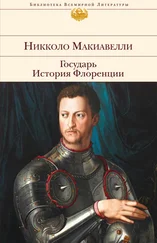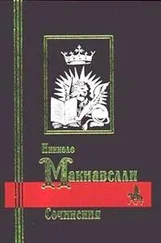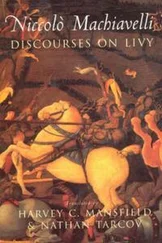Николо Макиавелли - History of Florence and of the Affairs of Italy
Здесь есть возможность читать онлайн «Николо Макиавелли - History of Florence and of the Affairs of Italy» весь текст электронной книги совершенно бесплатно (целиком полную версию без сокращений). В некоторых случаях можно слушать аудио, скачать через торрент в формате fb2 и присутствует краткое содержание. Год выпуска: 2014, Издательство: epubBooks Classics, Жанр: История, на английском языке. Описание произведения, (предисловие) а так же отзывы посетителей доступны на портале библиотеки ЛибКат.
- Название:History of Florence and of the Affairs of Italy
- Автор:
- Издательство:epubBooks Classics
- Жанр:
- Год:2014
- ISBN:нет данных
- Рейтинг книги:3 / 5. Голосов: 1
-
Избранное:Добавить в избранное
- Отзывы:
-
Ваша оценка:
- 60
- 1
- 2
- 3
- 4
- 5
History of Florence and of the Affairs of Italy: краткое содержание, описание и аннотация
Предлагаем к чтению аннотацию, описание, краткое содержание или предисловие (зависит от того, что написал сам автор книги «History of Florence and of the Affairs of Italy»). Если вы не нашли необходимую информацию о книге — напишите в комментариях, мы постараемся отыскать её.
History of Florence and of the Affairs of Italy — читать онлайн бесплатно полную книгу (весь текст) целиком
Ниже представлен текст книги, разбитый по страницам. Система сохранения места последней прочитанной страницы, позволяет с удобством читать онлайн бесплатно книгу «History of Florence and of the Affairs of Italy», без необходимости каждый раз заново искать на чём Вы остановились. Поставьте закладку, и сможете в любой момент перейти на страницу, на которой закончили чтение.
Интервал:
Закладка:
The pope having observed in the course of the war, how promptly and earnestly the Florentines adhered to their alliances, although he had previously been opposed to them from his attachment to the Genoese, and the assistance they had rendered to the king, now evinced a more amicable disposition, and received their ambassadors with greater favor than previously. Lorenzo de' Medici, being made acquainted with this change of feeling, encouraged it with the utmost solicitude; for he thought it would be of great advantage, if to the friendship of the king he could add that of the pontiff. The pope had a son named Francesco, upon whom designing to bestow states and attach friends who might be useful to him after his own death, saw no safer connection in Italy than Lorenzo's, and therefore induced the latter to give him one of his daughters in marriage. Having formed this alliance, the pope desired the Genoese to concede Serezana to the Florentines, insisting that they had no right to detain what Agostino had sold, nor was Agostino justified in making over to the Bank of San Giorgio what was not his own. However, his holiness did not succeed with them; for the Genoese, during these transactions at Rome, armed several vessels, and, unknown to the Florentines, landed three thousand foot, attacked Serezanello, situated above Serezana, plundered and burnt the town near it, and then, directing their artillery against the fortress, fired upon it with their utmost energy. This assault was new and unexpected by the Florentines, who immediately assembled their forces under Virginio Orsino, at Pisa, and complained to the pope, that while he was endeavoring to establish peace, the Genoese had renewed their attack upon them. They then sent Piero Corsini to Lucca, that by his presence he might keep the city faithful; and Pagolantonio Soderini to Venice, to learn how that republic was disposed. They demanded assistance of the king and of Signor Lodovico, but obtained it from neither; for the king expressed apprehensions of the Turkish fleet, and Lodovico made excuses, but sent no aid. Thus the Florentines in their own wars are almost always obliged to stand alone, and find no friends to assist them with the same readiness they practice toward others. Nor did they, on this desertion of their allies (it being nothing new to them) give way to despondency; for having assembled a large army under Jacopo Guicciardini and Pietro Vettori, they sent it against the enemy, who had encamped upon the river Magra, at the same time pressing Serezanello with mines and every species of attack. The commissaries being resolved to relieve the place, an engagement ensued, when the Genoese were routed, and Lodovico dal Fiesco, with several other principal men, made prisoners. The Serezanesi were not so depressed at their defeat as to be willing to surrender, but obstinately prepared for their defense, while the Florentine commissaries proceeded with their operations, and instances of valor occurred on both sides. The siege being protracted by a variety of fortune, Lorenzo de' Medici resolved to go to the camp, and on his arrival the troops acquired fresh courage, while that of the enemy seemed to fail; for perceiving the obstinacy of the Florentines' attack, and the delay of the Genoese in coming to their relief, they surrendered to Lorenzo, without asking conditions, and none were treated with severity except two or three who were leaders of the rebellion. During the siege, Lodovico had sent troops to Pontremoli, as if with an intention of assisting the Florentines; but having secret correspondence in Genoa, a party was raised there, who, by the aid of these forces, gave the city to the duke of Milan.
At this time the Dutch made war upon the Venetians, and Boccolino of Osimo, in the Marca, caused that place to revolt from the pope, and assumed the sovereignty. After a variety of fortune, he was induced to restore the city to the pontiff and come to Florence, where, under the protection of Lorenzo de' Medici, by whose advice he had been prevailed upon to submit, he lived long and respected. He afterward went to Milan, but did not experience such generous treatment; for Lodovico caused him to be put to death. The Venetians were routed by the Dutch, near the city of Trento, and Roberto da S. Severino, their captain, was slain. After this defeat, the Venetians, with their usual good fortune, made peace with the Dutch, not as vanquished, but as conquerors, so honorable were the terms they obtained.
About this time, there arose serious troubles in Romagna. Francesco d'Orso, of Furli, was a man of great authority in that city, and became suspected by the count Girolamo, who often threatened him. He consequently, living under great apprehensions, was advised by his friends to provide for his own safety, by the immediate adoption of such a course as would relieve him from all further fear of the count. Having considered the matter and resolved to attempt it, they fixed upon the market day, at Furli, as most suitable for their purpose; for many of their friends being sure to come from the country, they might make use of their services without having to bring them expressly for the occasion. It was the month of May, when most Italians take supper by daylight. The conspirators thought the most convenient hour would be after the count had finished his repast; for his household being then at their meal, he would remain in the chamber almost alone. Having fixed upon the hour, Francesco went to the count's residence, left his companions in the hall, proceeded to his apartment, and desired an attendant to say he wished for an interview. He was admitted, and after a few words of pretended communication, slew him, and calling to his associates, killed the attendant. The governor of the place coming by accident to speak with the count, and entering the apartment with a few of his people, was also slain. After this slaughter, and in the midst of a great tumult, the count's body was thrown from the window, and with the cry of "church and liberty," they roused the people (who hated the avarice and cruelty of the count) to arms, and having plundered his house, made the Countess Caterina and her children prisoners. The fortress alone had to be taken to bring the enterprise to a successful issue; but the Castellan would not consent to its surrender. They begged the countess would desire him to comply with their wish, which she promised to do, if they would allow her to go into the fortress, leaving her children as security for the performance of her promise. The conspirators trusted her, and permitted her to enter; but as soon as she was within, she threatened them with death and every kind of torture in revenge for the murder of her husband; and upon their menacing her with the death of her children, she said she had the means of getting more. Finding they were not supported by the pope, and that Lodovico Sforza, uncle to the countess, had sent forces to her assistance, the conspirators became terrified, and taking with them whatever property they could carry off, they fled to Citta di Castello. The countess recovered the state, and avenged the death of her husband with the utmost cruelty. The Florentines hearing of the count's death, took occasion to recover the fortress of Piancaldoli, of which he had formerly deprived them, and, on sending some forces, captured it; but Cecco, the famous engineer, lost his life during the siege.
To this disturbance in Romagna, another in that province, no less important, has to be added. Galeotto, lord of Faenza, had married the daughter of Giovanni Bentivogli, prince of Bologna. She, either through jealousy or ill treatment by her husband, or from the depravity of her own nature, hated him to such a degree, that she determined to deprive him of his possessions and his life; and pretending sickness, she took to her bed, where, having induced Galeotto to visit her, he was slain by assassins, whom she had concealed for that purpose in the apartment. She had acquainted her father with her design, and he hoped, on his son–in–law's death, to become lord of Faenza. A great tumult arose as soon as the murder was known, the widow, with an infant son, fled into the fortress, the people took up arms, Giovanni Bentivogli, with a condottiere of the duke of Milan, named Bergamino, engaged for the occasion, entered Faenza with a considerable force, and Antonio Boscoli, the Florentine commissary, was also there. These leaders being together, and discoursing of the government of the place, the men of Val di Lamona, who had risen unanimously upon learning what had occurred, attacked Giovanni and Bergamino, the latter of whom they slew, made the former prisoner, and raising the cry of "Astorre and the Florentines," offered the city to the commissary. These events being known at Florence, gave general offense; however, they set Giovanni and his daughter at liberty, and by the universal desire of the people, took the city and Astorre under their protection. Besides these, after the principal differences of the greater powers were composed, during several years tumults prevailed in Romagna, the Marca, and Sienna, which, as they are unimportant, it will be needless to recount. When the duke of Calabria, after the war of 1478, had left the country, the distractions of Sienna became more frequent, and after many changes, in which, first the plebeians, and then the nobility, were victorious, the latter and length maintained the superiority, and among them Pandolfo and Jacopo Petrucci obtained the greatest influence, so that the former being distinguished for prudence and the latter for resolution, they became almost princes in the city.
Читать дальшеИнтервал:
Закладка:
Похожие книги на «History of Florence and of the Affairs of Italy»
Представляем Вашему вниманию похожие книги на «History of Florence and of the Affairs of Italy» списком для выбора. Мы отобрали схожую по названию и смыслу литературу в надежде предоставить читателям больше вариантов отыскать новые, интересные, ещё непрочитанные произведения.
Обсуждение, отзывы о книге «History of Florence and of the Affairs of Italy» и просто собственные мнения читателей. Оставьте ваши комментарии, напишите, что Вы думаете о произведении, его смысле или главных героях. Укажите что конкретно понравилось, а что нет, и почему Вы так считаете.












